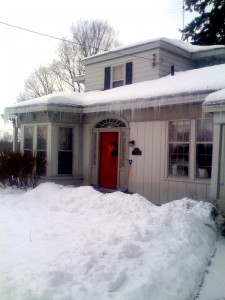Becoming Realer: Identity, Craft and the MFA is a column that explores issues of poetry, theory and writing craft in relation to the personal experiences of Saint Mary’s College of California Creative Writing MFA candidate and LR staff writer, Kelsay Myers.

The older I get, the harder it is to explain what I’m doing with my life. Thankfully, going home for the holidays is really the only time I need to. The Christmas and New Year’s parties, family friend get-togethers and annual reunions with high school and college friends are exhausting, particularly when I’m asked what I’m doing now. Getting an M.F.A. at Saint Mary’s College of California is cool but not specific enough, and writing creative nonfiction is not as self-explanatory as it sounds.
I was making Christmas gift exchanges at Caché when a colleague of my mother’s came into the store with his partner. After the general introductions and greetings, he asked what kind of writing I do. I explained that I do a cross between poetry and nonfiction. Then, he wanted to know who my favorite poet is. My answer was T.S. Eliot, though I internally debated whether to name Kimiko Hahn, Marilyn Chin, or Diane Seuss, all of whom have had a more formative impact on my writing and identity so far but are not generally well known. The brief look of bewilderment on his face or nervous silence that would inevitably follow didn’t seem worth it. For conversation’s sake, I said Eliot.
Not long after, my parents threw a dinner party for a high school friend of my mother’s who recently moved back to Grand Rapids, Michigan. They asked what kind of writing I do, and I said the same thing: a combination of nonfiction and poetry, this time adding that I address a lot of issues about race and social justice. And, since by that time I had warmed up to the question, I went one step further and said that I consider myself to be a modernist who writes like T.S. Eliot in “The Wasteland.” At that point, I shut up because I thought the comparison sounded a bit too pretentious .
Then again, in high school I compared my writing to Walt Whitman. My friends nicknamed me “Queen Elisabeth” because Elisabeth was my French name, and I was the most “elitist” of our group in terms of clothing, premium channel television shows and literature. Then, too, I had felt “The Wasteland” to be a precursor to my style of writing while reading it last semester in Foundations of Contemporary Literature. I had even considered writing with footnotes from then on since they could help people understand my writing more, but I find footnotes too distracting when reading a text despite the fact that understanding seems to be a big deal for me.
While writing about being a Korean adoptee, an Asian American activist, or the interracial and intercultural struggles I have with whiteness and Korean-ness, I am often thrown into an inner world that seems overwhelming and unstable. It makes me depressed. Last summer I complained to my psychologist that no one could understand the sadness I felt about the loss of my birth family and birth country. My grief was untranslatable. She told me that after losing a parent she too had felt that no one could understand her grief, but that eventually it changed. She stopped needing to be understood, and it became enough that others were there to listen. I wondered how long it would take me to get over the need to be understood—as an adoptee and as a writer.
I’m not there yet. Going home where I am asked continually what I do and what I write about makes that apparent. I feel compelled to explain, to justify and to make grand comparisons about my writing and what I want it to be.
I want it to be what T.S. Eliot said writing should be in “Tradition and the Individual Talent”:
Tradition… cannot be inherited, and if you want it you must obtain it by great labour. It involves, in the first place, the historical sense… not only of the pastness of the past, but of its presence; the historical sense compels a man to write not merely with his own generation in his bones, but with a feeling that the whole of the literature of Europe from Homer and within it the whole of the literature of his own country has a simultaneous existence and composes a simultaneous order.
Of course, my traditions are not derived from Homer and European literature, but from the Japanese zuihitsu, the Korean sijo, and Walt Whitman’s free verse. There are Asian American theorists like Lisa Lowe, Grace Lee Boggs, or E. San Juan Jr., poets like Diane Seuss, Marilyn Chin, and Kimiko Hahn. But, as we discussed in my Foundations class last semester, “the whole of the literature of his [or her] own country,” in our more culturally-sensitive, post-colonial world can be assumed to mean just that—the individual’s individual history and traditions. But there I go, trying to explain myself again.
You only need to explain yourself if you actually want people to understand…..
Good work. 🙂